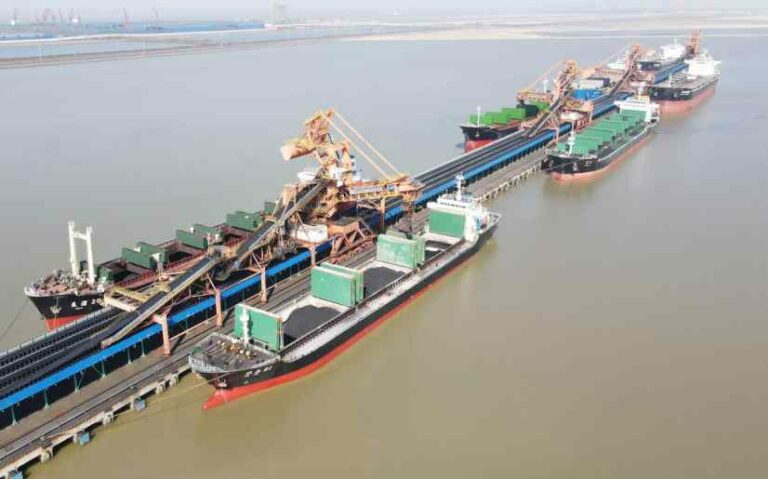
By Yu Jianbin, People’s Daily
The BeiDou Navigation Satellite System (BDS), a global navigation system independently developed and operated by China, has achieved in-depth application and extensive growth in various fields.
In the agricultural sector, BeiDou-related deep soil loosening machines, as well as drones for plant protection and seed sowing, can be remotely controlled and managed. In the forestry sector, BeiDou terminal products can assist forest rangers and fire guards to patrol forests and check their routes.
The navigation system has also been applied in other fields, including dam deformation monitoring, the establishment of management and monitoring platforms for the transportation of construction debris in urban areas, and measurement of the height of Mount Qomolangma, among others.
Statistics suggest that there were more than one billion terminal devices with the BDS positioning service by the end of 2021.
The BeiDou system has comprehensively served transportation, public security, emergency management, agriculture, forestry, animal husbandry and fishery, and many other industries. It has also been integrated into the construction of infrastructure projects in the fields of electric power, finance, and communications, widely adopted in the fields of mass consumption, sharing economy, and people’s livelihood.
The BDS has achieved a comprehensive breakthrough in mass consumption represented by its extensive application in smartphones and smart wearable devices.
The world’s major chipmakers, including component providers for smartphones, can provide products that widely support the BDS. BDS ground-based augmentation messaging has been applied in smartphones, with meter-level positioning capabilities.
In 2021, the number of China-made smartphone shipments with BDS application support reached 324 million, accounting for 94.5 percent of the country’s total that very year.
The BDS’s high-precision positioning and timing services had been used over 100 billion times per month as of March 2022, of which the monthly requests for the system’s acceleration auxiliary positioning service had exceeded 60 billion, and that for its real-time high-precision positioning services with centimeter-level accuracy and sub-meter level accuracy had surpassed 48 billion.
At present, the BDS’s acceleration auxiliary positioning service has been embedded in almost every China’s homemade smartphone. The BDS is employed to provide precise positioning and timing services for all kinds of intelligent machines, from automobiles, drones, shared bikes, and buses, to road infrastructure facilities, and to monitoring equipment of bridges and mines.
The BeiDou system has provided services for a total of more than 1.1 billion people from more than 100 countries and regions around the world.
The system has achieved integration across industries and regions, seeing thriving applications such as intelligent vehicle infrastructure cooperative systems and unmanned delivery, among others.
Industries won’t achieve digital and intelligent development without the support of major timing and positioning infrastructure.
By providing timing and positioning services, the BDS has become a major infrastructure that supports the development of the digital economy, being of great significance for promoting the synergy of the digital industry, digital transformation of industries, and digital governance, according to Yang Changfeng, chief designer of the BDS, who is also an academician with the Chinese Academy of Engineering.
China has included the application of BeiDou into its plans for many industries. A document issued in April 2022 on the key tasks for the development of digital villages specified that the country will promote the adoption of BeiDou terminal products in agricultural production.
The country also stated in a recent plan that it will vigorously develop smart transportation and speed up the application of the BDS during its 14th Five-Year Plan period (2021-2025). Specifically, China will push forward the innovative application of the BDS in autonomous driving, intelligent shipping, intelligent railway, intelligent civil aviation, and intelligent postal service, and build a BeiDou-driven industrial chain in the transportation sector, the plan said.
The constantly improving BDS and its increasing capabilities lay a solid foundation for the vigorous development of the BeiDou industry.
According to Yang, the size of the BeiDou industry is expected to reach one trillion yuan ($150.07 billion) around 2025, calculated by an average annual growth rate of 20 percent.
China aims to develop a widely ubiquitous, integrated, and intelligent national comprehensive positioning, navigation, and timing (PNT) system based on the BDS by 2035, to provide core support for the development of intelligent and unmanned systems.
By then, the BDS will better serve users from across the world and benefit all mankind by providing global users with full-coverage and highly reliable PNT service in environments such as indoors, outdoors, deep sea, and deep space.










